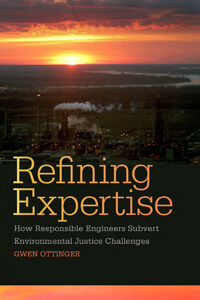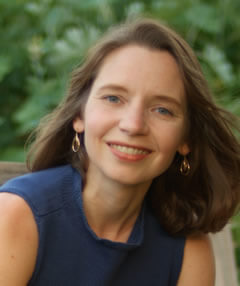Carson Prize 2015: Gwen Ottinger
The Rachel Carson book prize committee, Vivian Lagesen, Chair, Wen-Hua Kuo, Jessica Mesman, and Kelly Moore, received 63 nominated books in 2014 and has selected Refining Expertise. How responsible engineers subvert environmental justice challenges, by Gwen Ottinger, for this year’s prize.
Powerful and beautifully written, Refining Expertise tells a new and compelling story about expertise, activism, industry, and government. Through a rich ethnography of Louisiana (USA) communities struggling to contest industrial chemical pollution, Ottinger illuminates how the intersection of new a chemical industry strategy, new roles for government, and community pride combine to reduce community opposition to pollution. While there have been many other studies of opposition to chemical toxicity, Ottinger’s careful observation identifies a critical refinement in how industry expertise is deployed: first, industry representatives deliver technical knowledge in forms and organizational settings that make it appear as if the industry’s data were merely a technical, non-oppositional, and helpful contribution to a civil debate about how to ensure a healthy and prosperous community. Second, Ottinger shows how industry experts simultaneously play another role: that of community resident, just like their opponents, and therefore are personally and morally invested in ensuring community safety. These strategies obfuscate the vastly unequal power relations between industry and citizens in chemical debates, while taking advantage of the new political rhetoric of corporations-as-citizen and the state’s role as the mediator of environmental debates, not the enforcer of environmental law. Moreover, the strategy of depicting industry as just one more equal player in a civil debate forces groups who use heated rhetoric and disruptive tactics to the side, condemned by industry as well as some opponents as uncivil and needlessly inflammatory.

The Rachel Carson Prize is given to a work that is in the tradition of Rachel Carson’s work – exposing environmental damage from the unrestricted use of industrial chemicals. Ottinger’s work continues this tradition in the most obvious sense of studying industrial chemical pollution, as Carson did in Silent Spring. In its eloquence and sensitivity to the meanings of environments, broadly speaking, to human communities, her work extends Carson’s other award-winning book, The Sea Around Us, which won the 1951 National Book Award. Ottinger’s capacity to show that the stakes in battles over chemicals in the environment are about health, and also about how environments invoke the sounds, scents, sights, and feelings of emplacement that simultaneously provoke dissent, and allow it to be co-opted.
Acceptance Statement
Refining Expertise was largely written over an extended period of postdoctoral limbo, during which it was not always clear that I would be able to continue in the profession long enough to complete the book. It is thus no exaggeration to say that it never would have come into being without the support of the Chemical Heritage Foundation, which at a pivotal moment offered me a two-year research fellowship that enabled me to take the book from concept to contract. For this I am more grateful than I know how to say. Other kinds of support were also crucial. Over my years of writing, I was buoyed by the countless ways that colleagues, especially in 4S, communicated to me that my work had something important to add to the conversation. The senior scholars who remembered my name when they had no reason to, the search committee chairs who scrawled notes of encouragement at the bottom of rejection letters, the people I looked up to who agreed to meet someone they’d never heard of for coffee, and of course the peers who read drafts and helped me interpret reviews—each of their generous acts contributed to this book actually getting written. I am thankful to them as individuals, as well as to the Society as a whole for being a community in which such acts are unexceptional.
Writing this book was at times a refuge from the upheaval of my professional and personal life, and at times just plain fun. When I finished writing, I honestly missed it. What I didn’t realize was that it would be even more fun to have it out in the world, where other people could read it—and then talk to me about it. Over the past two years, it has been a delight to hear which parts resonated with others’ projects, and how it has been useful for students. Through these interactions, I’ve gained a new understanding of my own research and that of others, and I’ve had the pleasure of connecting with new colleagues. The book has also helped foster a deepening collaboration with residents of fenceline communities and those advocating on their behalf—including some of those who contributed so much to the book in the first place—as we begin to think together about how the tools of scholarship can make a meaningful contribution to real social change. In accepting this award, I want to thank everyone who has paid me the compliment of engaging with the book, looking for meaning in it, and offering their reflections on it. To the Carson Prize Committee, I am especially grateful for their thoughtful and generous portrayal of the book. I am humbled by the praise in their presentation and hope that my work may continue to live up to the legacy of Rachel Carson.
Biography
Gwen Ottinger is an assistant professor in the Department of Politics and the Center for Science, Technology, and Society at Drexel University. Her research aims to foster more environmentally just forms of science, technology, and expertise. Currently, she is working on a history of community-based air toxics monitoring, and on bringing together activists, health researchers, and information designers to create better tools for interpreting real-time air quality data.

